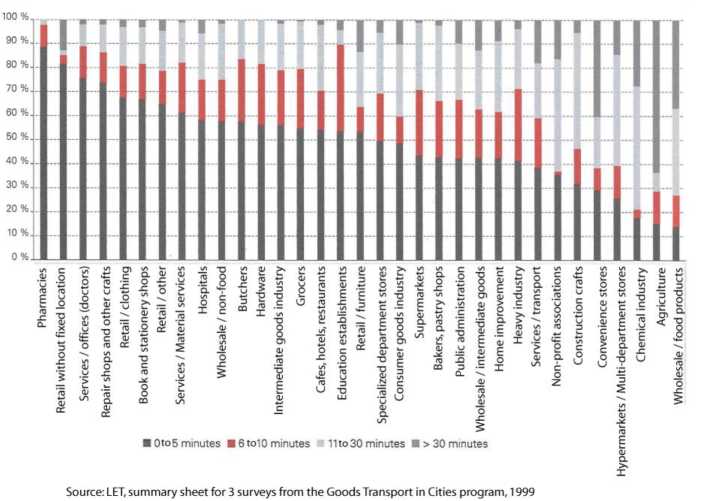How is own account transport well adapted to urban environments?
CRUZ, Cecilia
firm or group is 14% on average, as opposed to 19% for firms using third-party shipping. This
demonstrates that own-account shipping is not preferred for intra-establishment exchanges
within a firm or group.
3.2. Delivery schedules discourage mutualisation: two different ways to deliver
hal-00615151, version 1 - 18 Aug 2011
Figure 4 shows that unloading takes longer in the sectors that use own-account shipping
most, except for very large retail centres whose high volumes lead to longer times. Users of
own-account transport take their clients' specific expectations into account: for example, a
manufactured products wholesaler may offer inventory storage, or a Parisian caterer might
offer personalised delivery schedules and goods. Specialized service increases unloading
time, which takes an average of 47 minutes for own-account shipments (direct trips carried
out by vehicles less than 3.5 T Gross Vehicle Weight Rating) versus 26 minutes for third-
party shipments of the same kind. For delivery runs with less than 30 stops, the average
own-account unloading time was 13 minutes, versus 9 for third-party (Patier, 2004). This
observation holds independent of vehicle dimensions: the gap between own-account and
third-party unloading time persists for larger vehicles.

Figure 4: Unloading time according to business type. Source: Patier, 2002
Thus we see that own-account and third-party transport imply different ways of delivering due
to special client requirements. This is also true from the perspective of delivery schedules.
For example, drivers for a caterer in the Paris region start very early in the morning (5AM)
and end their shift at around noon. At this point other drivers begin a second shift that ends
at 8 PM. They may be called upon to carry out operations at unusual hours for special
events. Considering the unusual schedules and trips involved, it is difficult to find a suitable
third-party carrier.
12th WCTR, July 11-15, 2010 - Lisbon, Portugal
8
More intriguing information
1. New urban settlements in Belarus: some trends and changes2. Rural-Urban Economic Disparities among China’s Elderly
3. The name is absent
4. The Employment Impact of Differences in Dmand and Production
5. Name Strategy: Its Existence and Implications
6. Stillbirth in a Tertiary Care Referral Hospital in North Bengal - A Review of Causes, Risk Factors and Prevention Strategies
7. The name is absent
8. Developing vocational practice in the jewelry sector through the incubation of a new ‘project-object’
9. The name is absent
10. Reconsidering the value of pupil attitudes to studying post-16: a caution for Paul Croll